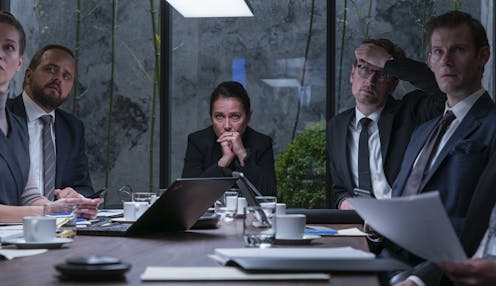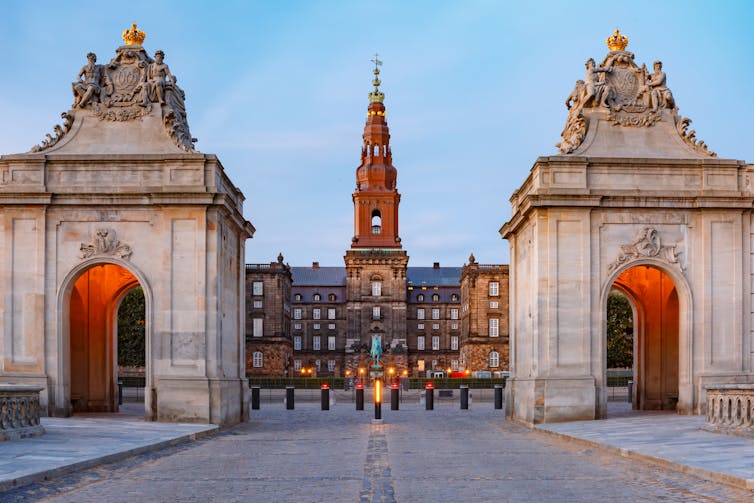
The political drama Borgen first aired in Denmark in 2010. It soon became clear that its creator, Adam Price, had an uncanny ability to predict and, at times, influence political events in the real Christiansborg Palace, the seat of Danish parliament. Borgen began with centrist politician Birgitte Nyborg becoming Denmark’s first female prime minister. This feat was “repeated” a year later in real life by Social Democrat Helle Thorning-Schmidt.
Airing in the Sunday primetime slot just before the news, it was sometimes difficult to tell fiction from political reporting. Episodes dealt with issues such as prostitution or industrialised pig farming that went on to become hot topics in politics and the press.
Almost ten years after the third series ended, the show is back for a fourth. Borgen: Power & Glory follows a now middle-aged Nyborg, a workaholic and principled minister of foreign affairs in a coalition government led by PM and Labour leader Signe Kragh. Kragh’s flair for down-to-earth Instagram snaps of food and sporting events will remind Danish viewers of the current Social Democrat PM Mette Frederiksen.
Price has maintained some of his predictive ability. In the first episode, Nyborg mentions the sanctioning of a Russian oligarch over the recent invasion of Ukraine. Most likely written with the 2014 annexation of Crimea in mind, viewers should be excused for believing that Borgen is entangled in a geopolitical present. A week after it aired in Denmark, Russia invaded Ukraine.
The new season has one major narrative arc: oil has been discovered in Greenland. The seasoned Nyborg rightly predicts trouble when geopolitical superpowers Russia, China and the US rush to assert themselves in the Arctic. Economic interests threaten to trump her party’s environmental ideals, and the already tense relationship between Greenland and Denmark threatens to erupt in a bitter struggle over political power and profits from oil extraction.
One of Borgen’s strengths lies in its portrayal of the increasingly tense geopolitical reality in the Arctic. Denmark and Greenland are both small players dependent upon larger powers.

It also depicts the unequal impacts of climate change. While colonial powers’ oil extractions have driven climate change for centuries, Indigenous people such as the Greenlandic Inuit are witnessing the effects on their vulnerable ecosystems. This reality opens old wounds in the Danish realm that includes the former colonies and current dependencies of Greenland and the Faroe Islands.
Colonialism continues on screen
Denmark colonised Greenland in the 18th century, nearly losing the country to the US during the second world war. In 1953, Denmark initiated a “decolonisation” of the country by integrating Greenland as an equal part of Denmark. Greenlanders’ desire for independence led to the introduction of home rule in 1979, and 30 years later Greenland achieved self-rule. Today, the Greenlandic people’s right to self-determination is recognised, and most policies, apart from foreign affairs, are decided in Greenland. However, the abuses of colonial rule throughout Greenland’s modern history have led to social problems such as alcoholism, sexual abuse and unemployment becoming endemic.
Borgen has never shied away from showing the darker sides of the colonial relationship between Denmark and Greenland. In the first season, Nyborg meets with Greenland PM Jens Enok to resolve the case of secret US flight landings with terrorist prisoners in Greenland. Enok reminds her that the issue started 300 years ago when Denmark colonised Greenland, and 60 years ago when Denmark forcefully removed the Inuit to make space for the American airbase. Nyborg initially dismisses Danish colonial guilt by suggesting that the Greenlanders are just “sitting around waiting for the ice to thaw so they can strike oil and get rich”. But Enok makes her realise that Denmark has played a substantial role in Greenland’s ongoing suffering.
In the fourth season, oil is finally struck – and little has changed in Nyborg’s mind. She bullies a Greenlandic delegation, arguing that they cannot be trusted to run their own country. Jens Enok, now a Greenlandic MP, enters again to explain Greenland’s desire to pursue oil extraction. He argues that Greenlanders are the victims of climate change, not its perpetrators. As such, Denmark should not stand in the way of their desire to enrich themselves and achieve full independence.
Greenlanders choose the environment
Contrary to the plot of Borgen, today’s Greenlanders prioritise environmentally sustainable development on the road to full independence. In 2021, Greenland’s new government was elected on the promise to stop a controversial Uranium and rare-earth mining project in Kuannersuit (Kvanefjeldet) in southern Greenland. The same government also put a stop to further oil exploration for environmental reasons.
It has also become near impossible to stay blind, as Nyborg does, to the colonial abuses perpetrated by the Danish state against Greenlanders. Earlier this year, the Danish PM publicly apologised on behalf of Denmark to 22 Greenlandic “children of the experiment”. They had been taken from their families in the 1950s and sent to Denmark to be trained as a future Greenlandic elite.
In June 2022, the abuse of 4,000 Greenlandic women as young as 13 by Danish health authorities, who implanted intrauterine devices without consent in the 1960s and 1970s, was revealed. In response, the Danish and Greenlandic governments have agreed to set up a commission to shed light on the historical relationship between the two countries.
As Borgen would be the first fictional television series to tell you, there is still a need for courageous politicians to deliver on environmental sustainability – and investigative journalism to hold them to account – and uncomfortable but necessary confrontations with colonial pasts. Borgen provides the drama and stays close to life, but should not be expected to always get its predictions right.
Jakob Stougaard-Nielsen does not work for, consult, own shares in or receive funding from any company or organization that would benefit from this article, and has disclosed no relevant affiliations beyond their academic appointment.
This article was originally published on The Conversation. Read the original article.







